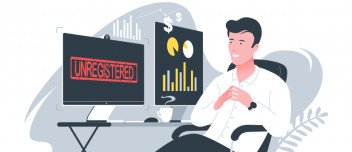.jpg)
Photo by Omid Armin on Unsplash
6 (And a Half) Things To Consider Before Investing in Forex
The Forex, or Foreign Exchange, market is the world’s biggest financial market if you consider the volume of transactions. It’s become increasingly popular in recent years because of its 24/7 accessibility and ease of trading via the internet. However, because of its high-risk nature and the prevalence of scams, investing in Forex is not for everyone. Consider the following points before you decide to start trading Forex.
What To Know About Forex Trading: 6.5 Things To Consider Before Investing in Forex
1. Whether You Know Enough About Forex
The first thing to ask yourself before you start investing in Forex is whether or not you know all the key facts of Forex trading. For instance, do you know what the major currency pairs are? Do you know what futures and options are? Do you know what a bid-ask spread is? These are just a few of the important aspects of Forex trading that you need to be familiar with to get started.
If you’re completely new to Forex trading, a good place to start is by reading articles about investing in Forex on reputable investment advice sites. A few good ones to check out are:
-
Investopedia
-
Yahoo! Finance
-
The Motley Fool
-
NerdWallet
In addition to understanding the fundamentals of Forex trading, make sure you know what all the different risks are. For example, get familiar with what leverage risks, interest rate risks, transaction risks, counterparty risks, and country risks are.
.jpg)
Photo by Joshua Mayo on Unsplash
2. Your Trading Plan and Goals
After you have a significant understanding of how to trade Forex, consider what your trading plan and goals are. Determine how much capital you have to invest in Forex and what your risk tolerance is. Then, you can decide how much to invest in your first trades (it’s best to start small and build up as you earn your initial ROIs).
Setting some profit goals for Forex trading is also a good idea. For example, you might say “I want to earn 10-15% profit a month, or 1-2% per trade. Keep in mind that about 95% of Forex traders lose on their trades, and you aren’t going to win every single trade you make, no matter what.
Additionally, you should set a realistic timeframe for your trading plan and goals. Forex trading takes a lot of time and commitment to actually earn good ROIs, so make sure you have the time and set a regular schedule to complete your Forex trades during.
3. Whether Your Broker Is Reliable
Whenever you make Forex trades, you’ll need to do so through a reliable broker to avoid getting scammed. One of the best ways to verify whether or not a broker you’re considering going through is trustworthy is to check if they’re on any Forex broker blacklists, such as the Top10CHB blacklist of fake Forex brokers.
You can do a quick “CTRL+F” search on any blacklist and type in the name of the broker to see if they appear on it.
Even if you don’t find your broker’s name on a blacklist, it doesn’t guarantee that they are legit. You should also type their name into Google, followed by keywords like “scam,” “fraud,” and “reviews,” to see if there are any negative articles or reviews written about them committing unethical or fraudulent behavior. Again, even if nothing bad pops up, it’s still possible to get scammed.
4. The Currency Pairs You’re Trading In
Every currency pair behaves a little differently in the Forex market, so make sure you know how the currency pairs you want to trade in work. For beginners, it’s best to start trading Forex pairs that fall within the 7 most popular currency pairs:
-
Euro and US Dollar: EUR/USD
-
US Dollar and Japanese Yen: USD/JPY
-
British Pound Sterling and US Dollar: GBP/USD
-
US Dollar and Swiss Franc: USD/CHF
-
Australian Dollar and US Dollar: AUD/USD
-
US Dollar and Canadian Dollar: USD/CAD
-
New Zealand Dollar and US Dollar: NZD/USD
You should also stay aware of what’s going on in each of the countries where the currency pairs you’re trading in are from, as political and economic developments can greatly affect how the different currencies perform.
5. Your Leverage
Leverage is when a Forex broker allows you to trade larger capital with a small amount of money, known as a margin requirement. For example, a broker might allow you to trade $10,000 worth of a currency pair in exchange for a margin payment of only $1,000. This would be a leverage of 10:1.
While larger leverages allow you to potentially gain much more on your Forex trades, they are also very risky. Experts recommend that you never trade at a leverage larger than 5:1, unless you have a very high risk tolerance.
6. Having the Right Attitude
Many people want to learn how to use Forex trading to make money, but they rush into it without fully understanding the markets and understanding all the key facts of Forex trading. It’s important to make sure you know everything you need to know about Forex trading before you start putting your hard-earned money into it, which can potentially result in huge losses.
You must understand that you WILL lose on many of your trades, and that making money by investing in Forex is a process that takes a lot of time and discipline. The most successful Forex traders dedicate time to it every day, and are constantly learning from their mistakes. If you go into Forex trading with the right attitude — ready to make mistakes, lose money, and learn in order to MAKE money — you will have a higher chance of success.
6.5 Having a Chargeback Company on Hand Should You Need
We hope that you will never need a chargeback company to help retrieve stolen funds from a Forex scam, but there are many different Forex scams out there that anyone can fall for. That’s why you should make sure you know who to contact in the unfortunate event that you fall victim to a Forex scam.
If you don’t ever need to use a chargeback company, that’s the ideal best-case scenario! But, you’ll have the information handy if you ever do need help getting your money back from scammers. Think of it as an insurance policy that you have in your back pocket if a Forex trade goes very wrong and you realize you’ve been scammed by fake or shady Forex brokers.
Choosing the Right Broker Is Imperative To Avoiding the Need for a Chargeback Company
If you’re investing in Forex, start by making sure you know how to trade Forex. Then, consider all the other tips mentioned above to improve your odds of making profitable trades and minimize your risks, including choosing a reputable, non-blacklisted broker to go through.
Be aware that the Forex markets are very high risk, and that there are also many scam brokers out there who take advantage of new, eager Forex investors and steal their funds. Stay up to date on the latest Forex scams by reading blogs, forums, and investment advice sites.
If you ever need the help of a chargeback company to get your money back after a Forex scam, check the reviews of verified chargeback companies on the Top10Chargeback website to pick a company to work with. Better yet, take a look at them now, so you already know who to contact in the event that you get scammed when you start Forex trading!






